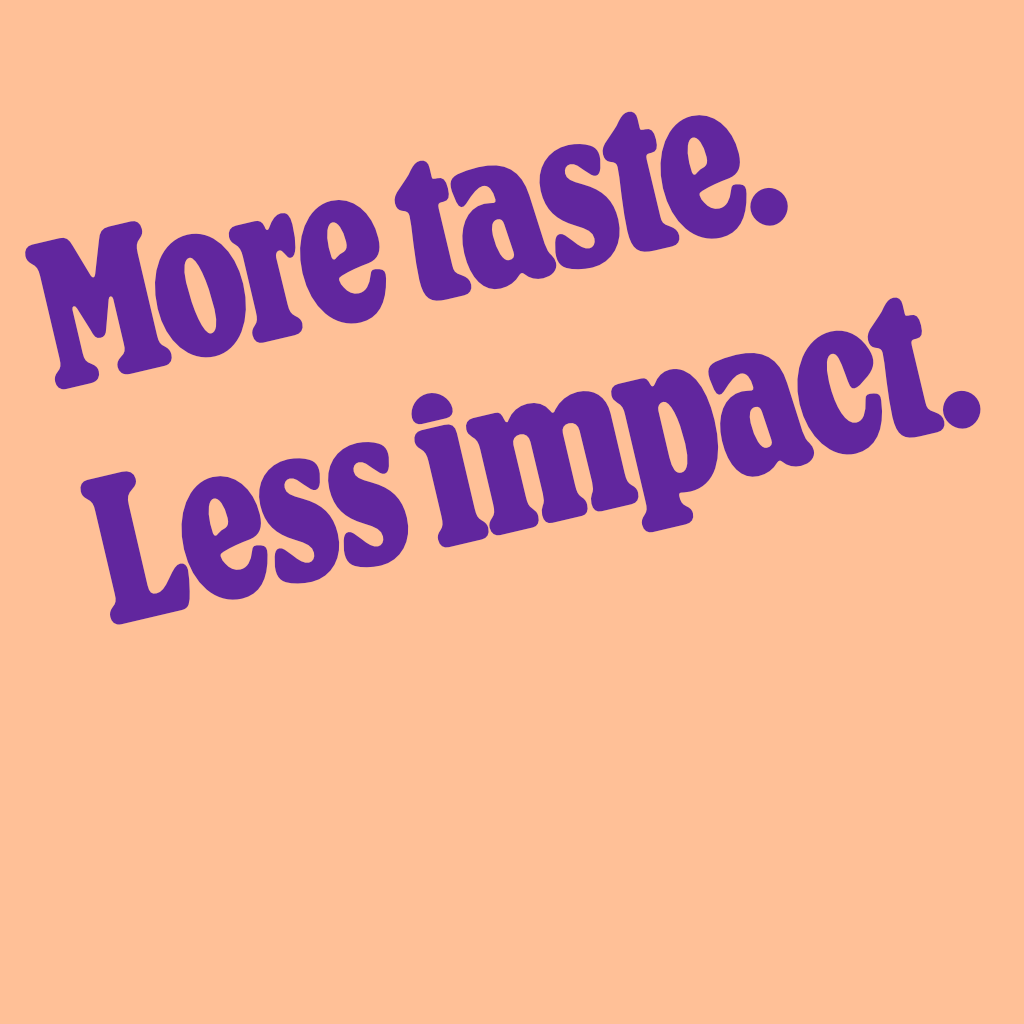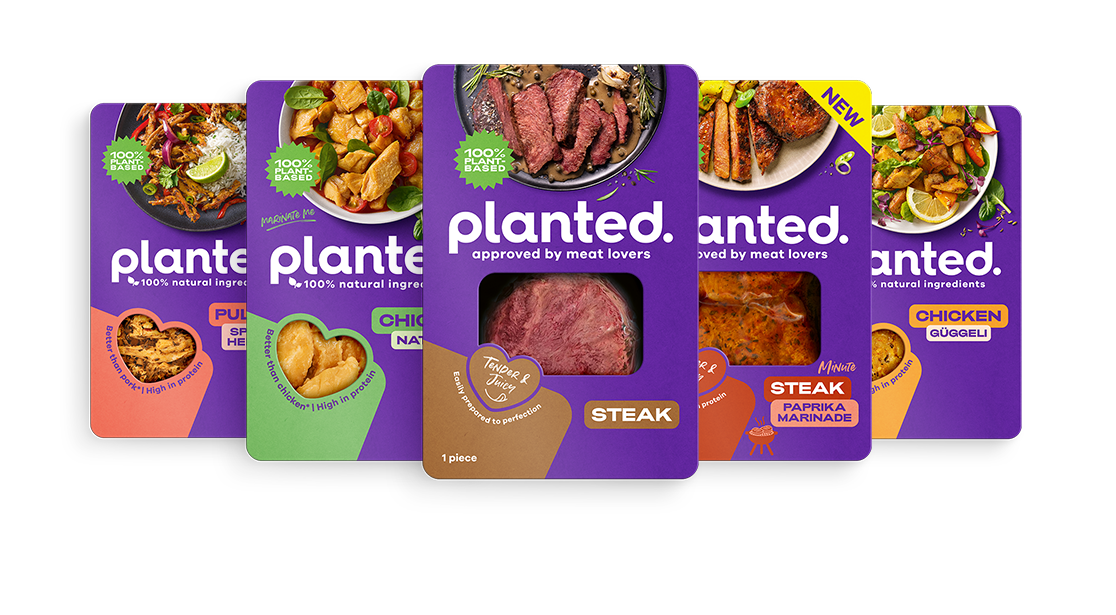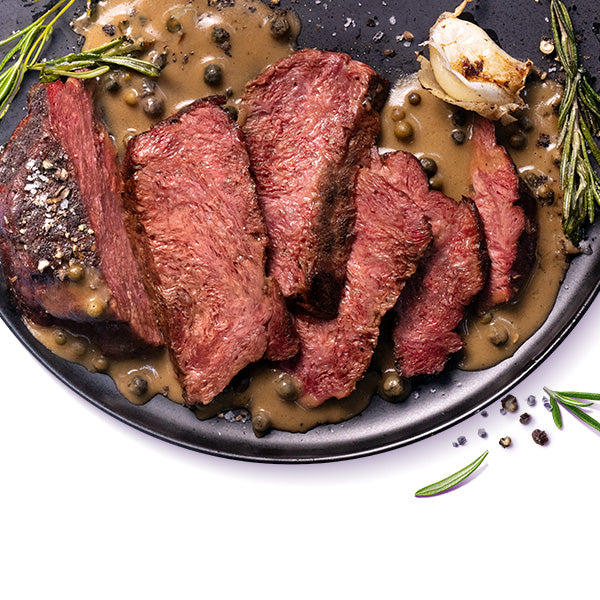
Great news! Our products now save even more water and CO2 emissions!
The Swiss food tech startup Planted, known for its plant-based meat made from purely natural ingredients, is publishing updated calculations on the product's environmental footprint. These prove that Planted meat has a significantly better footprint in terms of greenhouse gas emissions and water consumption than animal counterparts. The figures were calculated by the independent expert Eaternity.
Kemptthal, Switzerland, 01 March 2023-. The current food system is based on resource exploitation and commercial livestock farming. It is unsustainable, destroys our environment and accelerates climate change - putting the food security of 8 billion people at risk. Swiss foodtech startup Planted wants to change the market, saying it's time for a shift toward healthy plant-based eating habits. To back up this push and to monitor and document the environmental impact of its own products, the company has, for the first time in 2019/2020, set up a life cycle assessment for its four core products. Now Planted is publishing a late 2022 update to its CO2- and water footprints. The analysis reconfirms that Planted's plant-based meat product portfolio is extremely resource efficient compared to similar animal-based meat products, producing 77-87% less CO2-equivalent emissions are produced and 75-90% of water is saved. The calculations were made with the help of Eaternity, an independent expert specializing in the life cycle assessment of food.
Plus, all of Planted's plant-based meats have been re-certified with the Eaternity Score. Just like in 2021, the products received top marks in all categories: CO2, water scarcity, rainforest, and animal welfare.
Food production has a major impact on global greenhouse gas emissions
Although they only provide 37% of our protein and 18% of our calories, the negative environmental impacts of animal products far outweigh those of plant-based alternatives. For example, a quarter (26%) of global emissions are caused by food, and more than half (58%) of food emissions come from animal products. In addition, agriculture claims half of the planet's habitable land, and livestock farming contributes to a loss of biodiversity as forests and wild lands are converted into fields for growing animal feed. This in turn results in the loss of the natural carbon sink, which helps to cool the global temperature. Water resources are also polluted by wastewater from livestock farming and further strained by the irrigation of feed crops.
Better than meat from animals – big taste, smaller footprint
Planted's eco-balance analyzed greenhouse gas emissions (CO2-eq) and the water footprint (fresh and scarce water) on a cradle-to-gate basis and compared them with the most similar animal counterparts (e.g. Planted's plant-based chicken was compared with animal chicken breast).
Savings of Planted products compared to animal counterparts in percent
|
|
CO2-eq |
Water |
|
planted.chicken |
77 % |
85 % |
|
Planted.pulled |
83 % |
75 % |
|
planted.kebab |
87 % |
85 % |
|
Planted.schnitzel |
87 % |
90 % |
Greenhouse gas emissions
The comparison with animal meat products was calculated based on the cradle-to-gate approach. This determined how many CO2-equivalent emissions are released during a product's lifecycle until it leaves the production center (including agricultural production of raw materials and their processing). Steps such as transport to the store were not considered, as these are similar for both meat products.
The assessment showed that all of Planted's plant-based meats available in retail emit 77-87% less CO2-eq. compared to their animal counterparts. The most significant reductions come from avoiding emissions from livestock farming.
Example planted.chicken: planted.chicken is responsible for 1.62 kg CO2-eq/kg, animal chicken breast is responsible for 7.01 kg CO2-eq/kg. This means that planted.chicken is responsible for 77 % less CO2-eq emissions per weight of product.
Freshwater and scarce water resources
This comparison was calculated to determine how much water is used for plant irrigation as well as for drinking water, housing animals, slaughtering and production.
The assessment showed that all of Planted's plant-based meats available in retail use 75-90% less fresh water compared to their animal counterparts. This is because large amounts of water are required to irrigate animal feed crops, and additional resources are also used during the animal's life. In addition, all of Planted's plant-based meats have a very small water scarcity footprint. This means that the ingredients come from regions where there is little or no water scarcity.
Example planted.chicken: 1 kg of chicken breast consumes 755 liters of fresh water and 204 liters of scarce water. If you compare planted.chicken with animal chicken breast, planted uses 85% less fresh water and 80% less scarce water per weight of product.
Savings with Planted products
For Planted consumers, this means that choosing a planted.schnitzel instead of a pork schnitzel reduces the climate footprint by 87% CO2-eq per kilogram. While the production of one kilogram of pork schnitzel emits as many greenhouse gas emissions as a 54 km car journey, the production of planted.schnitzel only emits the equivalent of 7 km.
In addition, the amount of water needed to produce one kilogram of pork schnitzel is equivalent to 67 times the water required to run a normal dishwasher. planted.schnitzel requires water equivalent to only seven dishwasher cycles, thus saving 90 % water.
For Christoph Jenny, co-founder of Planted, these values underline that the company is on the right track. "We have set ourselves the goal of offering products that are better than animal meat - and that do not have the negative environmental consequences associated with animal husbandry. We want to offer future generations more choice and produce natural products that are good for our planet, are healthy and taste great at the same time. The updated assessment shows that our improved recipes, better packaging and modified distribution systems have an even greater impact on the carbon and water footprint than previously thought," says Jenny. And further: "We are proud of every step we take and will not stand still. Reducing plastics and energy in our supply chain is another important focus."
Vision
Planted is further increasing its impact by launching its firstplanted.chicken chicken breast in September 2022) and even larger and redder cuts of meat in the future. This will enable consumers to make positive plant-based choices in all situations of daily meat consumption without compromising on taste or texture.














